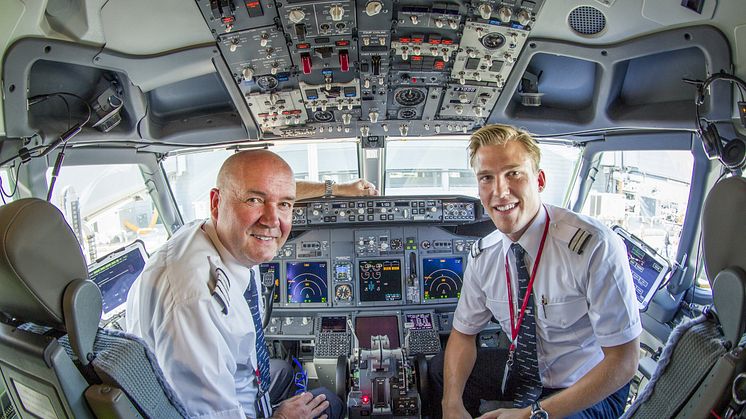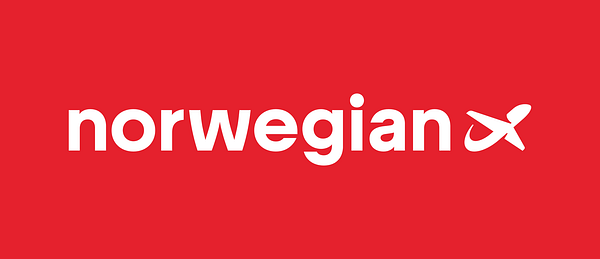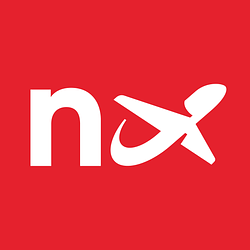
Press release -
Norwegian adopts new technology that reduces CO2 emissions by 16,000 tons per year
Following a successful test project, Norwegian will expand its cooperation with AVTECH Sweden AB to further reduce fuel consumption. A report by the Swedish Energy Agency, which partly financed the project, shows that fuel consumption was reduced by 22 kilos per flight. This equals an annual CO2 reduction of 16,000 tons - or a reduction of 5,000 tons of fuel per year, which in turn leads to reduced costs for Norwegian.
The new technology, Aventus Air™ weather service, provides Norwegian’s pilots with highly accurate wind and temperature information in accordance with their flight plan. Data is transferred to the aircraft’s systems, which makes it possible to optimise the flight path for improved fuel efficiency and reduced emissions.
"We work actively to reduce emissions. We have one of the youngest and most environmentally friendly fleets in the world, which has enabled us to reduce emissions by more than 30 percent since 2008. Our ambition is to continue to reduce emissions per passenger with fuel-efficient aircraft and with innovative technology. The AVTECH project demonstrates that fuel consumption can be further reduced by using advanced weather data. We are looking forward to establishing a permanent partnership that benefits both the environment and Norwegian's costs," says Tomas Hesthammer, Norwegian’s Director of Flight Operations.
About the reportThe project has been partly financed by the Swedish Energy Agency, which has published a report on the test project. Data from a total of 29,000 flights completed in November and December 2017 have been analysed. The results show a reduction of 640 tons of fuel on Norwegian’s flights during this period. This corresponds to an annual CO2 reduction of 16,000 tons, or an annual reduction of 5,000 tons of fuel on Norwegian’s flights.
Norwegian actively works to reduce emissions
Reduced fuel consumption is crucial to reducing emissions. In anticipation of biofuel becoming commercially available and manufactured in large scale, new aircraft is the single most important measure an airline can take to reduce emissions.
In September this year, Norwegian was named the world's most fuel-efficient airline on transatlantic routes by the The International Council on Clean Transportation (ICCT). The ICCT’s analysis shows that Norwegian has a fuel consumption of 44 passenger kilometers per liter, which is 33 percent more fuel-efficient than the industry average.
Read more about Norwegian's environmental initiatives here:
https://www.norwegian.com/uk/about/company/corporate-responsibility/environment/
Topics
Norwegian in the UK and Ireland:
- Norwegian carries 5.8 million UK passengers each year from London Gatwick, Edinburgh and Manchester Airports to 50 destinations worldwide
- Norwegian is the third largest airline at London Gatwick, with 4.6 million yearly passengers, and with more than 1,000 UK-based pilots and cabin crew
- In 2014, Norwegian introduced the UK’s first low-cost, long haul flights to the U.S. - the airline now flies to 11 U.S destinations, Buenos Aires and Singapore
- In 2017, Norwegian also launched affordable transatlantic flights from Edinburgh, Belfast, Dublin, Cork and Shannon to the US East Coast, using the brand new Boeing 737 MAX aircraft
- Norwegian is the only airline to offer free inflight WiFi on UK flights to more than 30 European destinations
- The airline has one of the youngest aircraft fleets in the world with an average age of 3.7 years, including next-generation Boeing 787 Dreamliner, Boeing 737 MAX and Boeing 737-800s
- Norwegian has been voted ‘Europe’s best low-cost carrier’ by passengers for six consecutive years at SkyTrax World Airline Awards from 2013-2018, along with being awarded the ‘World's best low-cost long-haul airline’ in 2015, 2016, 2017 and 2018
- Norwegian Reward is the airline's free to join award-winning loyalty programme offering members CashPoints and Rewards that reduce the cost of Norwegian flights


